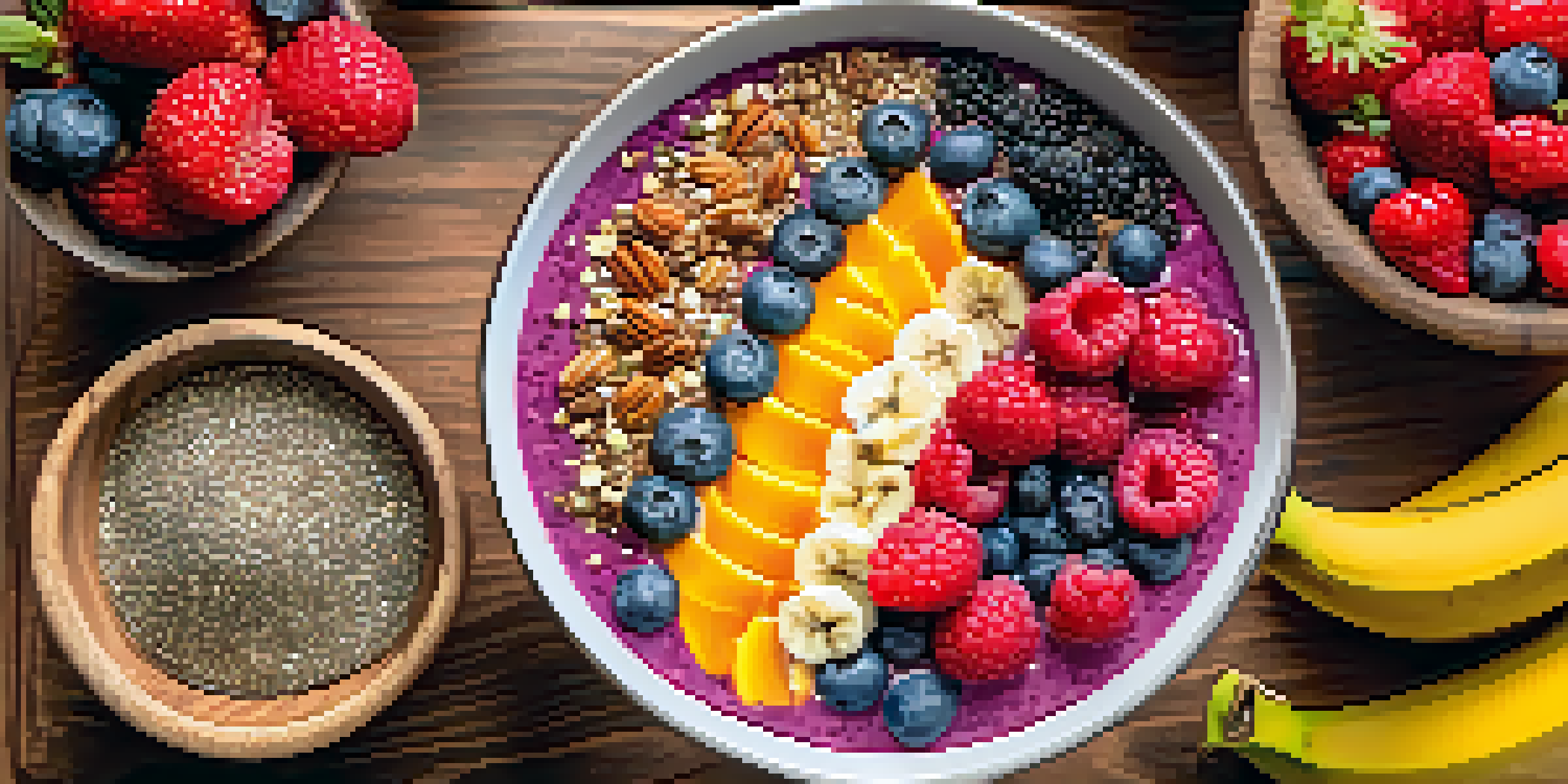The Impact of Omega-3 Fatty Acids on Vegetarian Health

Understanding Omega-3 Fatty Acids and Their Importance
Omega-3 fatty acids are essential fats that our bodies can't produce on their own, making it crucial to obtain them through diet. These fats play a vital role in brain health, heart health, and reducing inflammation. For vegetarians, understanding where to source omega-3s is particularly important, as many common sources are animal-based.
You are what you eat, so don't be fast, cheap, easy, or fake.
There are three main types of omega-3s: ALA (alpha-linolenic acid), EPA (eicosapentaenoic acid), and DHA (docosahexaenoic acid). ALA is primarily found in plant sources like flaxseeds and walnuts, while EPA and DHA are generally found in fish. This distinction is important for vegetarians, as they need to focus on ALA-rich foods to meet their omega-3 needs.
Incorporating omega-3s into a vegetarian diet can lead to numerous health benefits, but it requires a mindful approach to food choices. By understanding the different types and sources of omega-3s, vegetarians can make informed decisions to support their health.
Key Plant-Based Sources of Omega-3 Fatty Acids
Vegetarians can find ample sources of ALA omega-3s in various plant foods. Flaxseeds, chia seeds, hemp seeds, and walnuts are some of the richest sources, making them easy additions to smoothies, cereals, or salads. Just a tablespoon of flaxseed can provide a substantial amount of the daily recommended intake of ALA.

Other sources include algae-based supplements, which provide both EPA and DHA, similar to fish oil. This is an excellent option for vegetarians who want to ensure they're getting all three types of omega-3s without consuming fish. Algae oil capsules are widely available and can complement a vegetarian diet effectively.
Essential Omega-3s for Vegetarians
Vegetarians must prioritize omega-3 fatty acids from plant sources to support overall health.
Incorporating these foods into meals doesn't have to be complicated. For instance, adding chia seeds to yogurt or sprinkling walnuts on a salad can boost omega-3 intake with minimal effort.
Health Benefits of Omega-3s for Vegetarians
Omega-3 fatty acids offer a plethora of health benefits that are especially pertinent to vegetarians. They can help support cardiovascular health by lowering triglyceride levels and reducing blood pressure, which is crucial for maintaining heart health. This is particularly important as vegetarians may sometimes miss out on certain nutrients typically found in meat.
Let food be thy medicine and medicine be thy food.
Additionally, omega-3s are known for their anti-inflammatory properties, which can help combat chronic diseases. For vegetarians who rely on plant-based diets, the inclusion of omega-3s can bolster overall health and well-being, enhancing the positive effects of a vegetarian lifestyle.
Furthermore, omega-3 fatty acids play a significant role in brain health. They are associated with improved cognitive function and mood stabilization, making them vital for anyone, especially those who might be at risk for deficiencies due to dietary choices.
The Role of Omega-3s in Mental Health
Emerging research suggests that omega-3 fatty acids can have a profound impact on mental health. Studies have shown that higher consumption of omega-3s is linked to lower rates of depression and anxiety. For vegetarians, ensuring adequate omega-3 intake can be a crucial part of maintaining emotional well-being.
The brain is composed largely of fat, and omega-3s are essential for maintaining its structure and function. They help facilitate communication between brain cells and support neurotransmitter function, which can influence mood and cognition. This is particularly vital in today's fast-paced world where mental health is increasingly prioritized.
Key Plant Sources of Omega-3s
Foods like flaxseeds, chia seeds, and walnuts are excellent ALA sources that can easily be included in a vegetarian diet.
Including omega-3-rich foods in your diet can be a simple yet effective way to enhance mental clarity and emotional resilience. Whether it’s through a delicious smoothie with chia seeds or a salad topped with walnuts, these heart-healthy fats can support mental health in a vegetarian diet.
Potential Deficiencies in Vegetarian Diets
While a vegetarian diet can be incredibly nutritious, it may lack certain nutrients, including omega-3 fatty acids. This deficiency might lead to various health issues, such as increased inflammation or cognitive decline. It's essential for vegetarians to be aware of this potential gap and take steps to fill it.
A diet low in omega-3s can also affect skin health, leading to dryness and irritation. Incorporating omega-3-rich foods can nourish the skin from within, helping to maintain its hydration and elasticity. For those who prioritize skincare, this is yet another reason to include these healthy fats.
Regularly assessing your diet and considering supplementation if necessary can help prevent omega-3 deficiency. This proactive approach ensures that vegetarians can enjoy all the health benefits associated with these essential fatty acids.
How to Increase Omega-3 Intake as a Vegetarian
Increasing omega-3 intake as a vegetarian can be straightforward with a few simple changes to your diet. Start by incorporating more flaxseeds and chia seeds into your meals; they can be easily sprinkled on breakfast bowls or blended into smoothies. Small adjustments like these can significantly boost your omega-3 levels without much hassle.
Another effective way is to include more walnuts in your diet, which can serve as a healthy snack or a crunchy topping for salads. Additionally, consider trying algae oil supplements, which provide a direct source of EPA and DHA, ensuring you're covering all bases for omega-3 intake.
Omega-3s Enhance Mental Health
Omega-3 fatty acids are linked to improved mental clarity and emotional balance, making them vital for vegetarians.
Meal planning can also play a crucial role in increasing omega-3 consumption. By dedicating a little time each week to prepare meals that include these omega-3-rich foods, you can effortlessly integrate them into your diet and enjoy their numerous health benefits.
Conclusion: Embracing Omega-3s for a Healthier Life
Incorporating omega-3 fatty acids into a vegetarian diet is essential for overall health and well-being. By being mindful of food choices and including rich sources of ALA, vegetarians can reap the benefits of these essential fats. With various plant-based options available, it's easier than ever to prioritize omega-3 intake.
The impact of omega-3s extends beyond physical health; they also play a crucial role in mental clarity and emotional balance. For vegetarians, this could mean a more vibrant life filled with energy and positivity. By embracing these healthy fats, individuals can enhance their vegetarian lifestyle significantly.

Ultimately, making small dietary adjustments can lead to significant health improvements. Whether through whole foods or supplements, ensuring adequate omega-3 intake is a crucial step toward a healthier life.